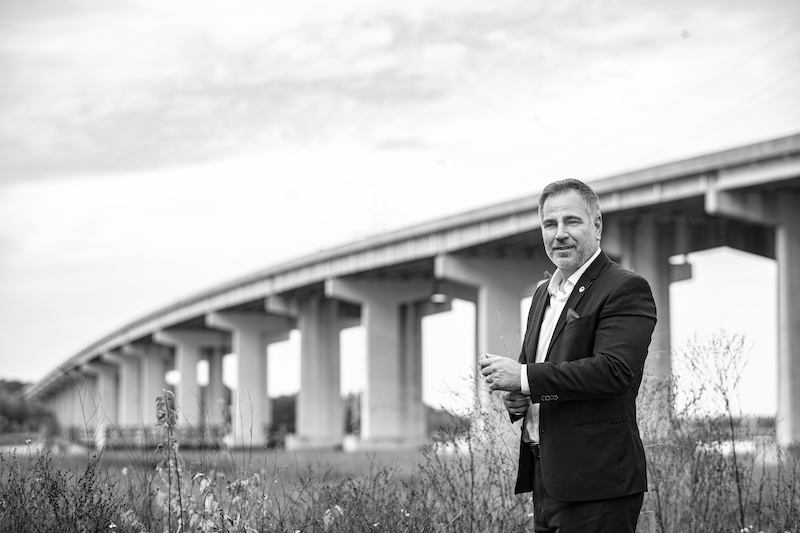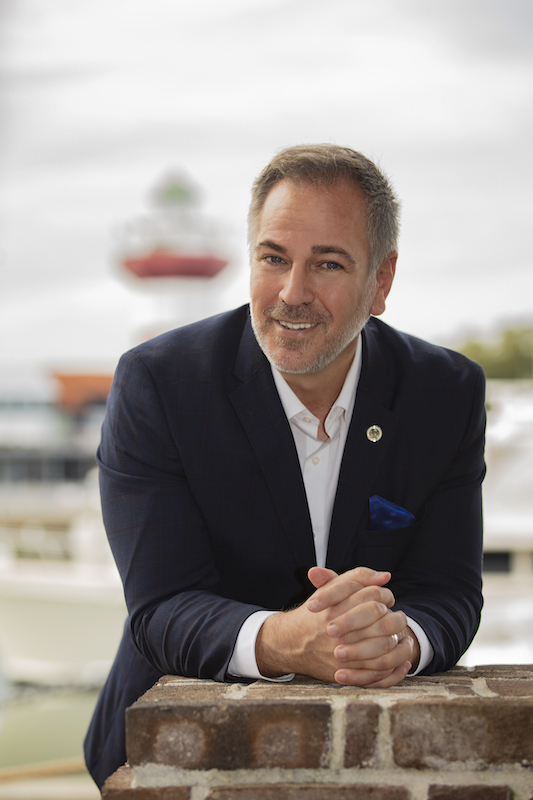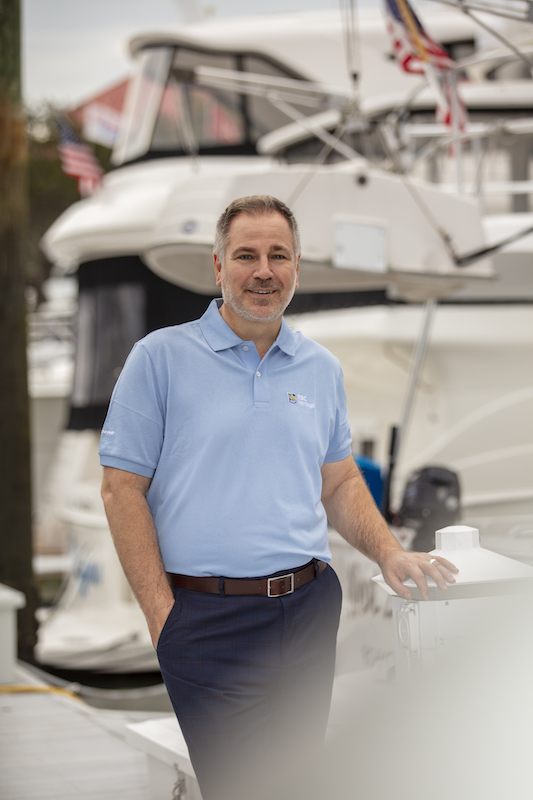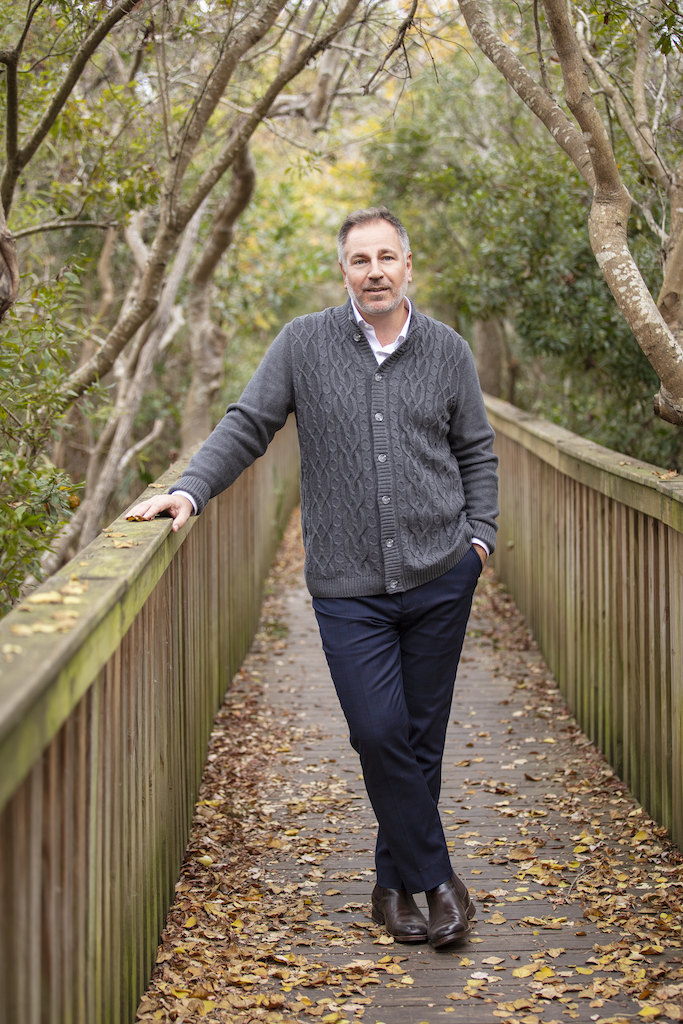
Many of his peers saw the move as inevitable, but for a guy who has made a career out of high-level planning and thinking five steps ahead, Marc Orlando truly didn’t see 2021 coming.
Life in Bluffton was exciting. Big economic boosters like the Burnt Church Distillery project were nearing completion. He had built a talented staff with strong morale and a family atmosphere. In the midst of an unprecedented pandemic, he focused on keeping friends, family and residents safe.
“For years, that was my past,” said Hilton Head Island’s new town manager of beginning his career working for the town. “I’m always looking forward. This move was like a lightbulb lit up. One day, it just made sense to have a conversation. The more we talked, the more it was clear. It was time to come home.”
Orlando came to Hilton Head Island in 1997, a Canadian import from the University of Windsor who saw law school and the big city in his future. But an internship with the town turned into a whole new life direction.
“I fell in love with the culture, the way of life here. And not just the beach. It’s the history here that truly captured me,” Orlando said. “The Gullah Geechee, the Civil War, the trailblazers. The roots here—there was so much history to build upon.”
Orlando has spent the past 23 years helping to build the Lowcountry, including 14 years leading the evolution of Bluffton from a one-square-mile, pass-through hamlet into a booming centerpiece of growth.
He was hired by legendary island leader Steve Riley, whom he saw first as a visionary and a mentor, then a colleague and friend. When talk of the seemingly indefatigable Riley retiring became a reality, Orlando didn’t see himself as one to follow footsteps. But the idea of a new challenge in a place so central to his personal growth was alluring.
Annexation and population growth was a key part of his Bluffton story. On the island, it’s all about a growth and renewal of existing spaces and assets.
“Steve taught me so much, but his mandate from Town Council was unique to him. Town Council made it clear from the first conversation that my skill set would fit their plans for the future,” he said. “We have amazing opportunities to reimagine some key spaces and resources here. It’s about maximizing what we have, and this island already has so much. The more I’m here, the more I realize that this is my calling at this time in my life.”
It’s 6:30 a.m. Windsor, Ontario, circa 1994. Orlando is prepping for a day of work at the gym. He’d worked retail, selling high-end suits to local businessmen, made enough to help pay for college. Personal training was the latest means to an end.
While a few early risers were busy on treadmills, Orlando got caught in his manager’s office playing Sim City on the computer.
“I loved Sim City, it was just brilliant, but the gym owner didn’t quite see it as a great use of time,” Orlando said.
Orlando’s mom raised him and his older brother on her own, working for the city’s Medical Officer of Health. While the Orlando boys were begging to watch Canadiens hockey, she hogged the lone TV, watching city meetings.

“She taught me to appreciate how cities get built, how decisions are made and how cities evolve from that work, and that stuck,” he said. “She showed me the importance of getting involved.”
Orlando realized shortly after arriving on Hilton Head Island that he could have an impact in making Sim City real.
“I love architecture, I love real estate, I am infatuated with the details, with the idea of one building, one idea, taking root and impacting an entire community,” Orlando said. He saw folks like Thomas Barnwell, Charles Fraser and Riley have that impact time and again in evolving the island.
When he moved across the bridge to Bluffton in 2006, Orlando earned a fast reputation for being a doer—the guy who could hear a plan, improve it with a few tweaks and empower those around him to get the job done.
“A town, a city, it’s a business. Marcus Lemonis, The Profit, can go into any business and understand the foundation of success, no matter the industry,” Orlando said. “I love that show because it highlights that a core belief in fundamentals leads to success anywhere.”
For Orlando, the basis of success in evolving a town’s culture begins with a place-based approach to growth. From the Old Town Historic District to the Don Ryan Center for Innovation to Buckwalter Place to Palmetto Bluff, Orlando believed that the land and what it represents to growth was always the star. “We knew if we put the right energy in core locations, that would show others the larger vision of what we could be,” he said.
While he was all-in on building Bluffton into a 54-square-mile epicenter of regional growth, his family was still largely centered across the bridge. He met his wife Jaclyn on Hilton Head, where her family founded eateries like Pino Gelato and La Famiglia.
“The kids went to school at St. Francis on the island; my mom lives on the island; so, I spent a lot of my day going back and forth over that bridge,” Jaclyn said. “To see what Marc was achieving in Bluffton, the family we had with the staff, the back and forth was just part of the life we were building.”
It was all worthwhile as Jaclyn saw others gravitate to the same qualities that drew her to Orlando during their courtship. “He’s a visionary, he’s always thinking, always evolving, always dreaming,” she said. “He’ll take me on drives, tours just to see landscaping, a cool street, an innovative neighborhood design. It’s what excites him, and to be in his orbit, it’s impossible not to be excited by his passion. To see a plan like Bluffton’s Streetscapes project, the parks and the evolution of Old Town come to fruition, it brought me to tears because he was so proud to be part of evolving what was already great.”
Some might say Bluffton was more of a blank canvas than what he’s inheriting on Hilton Head. “Hogwash,” Orlando said. “I’m thrilled to be working with a town council that wants to evolve, that knows we want to respect our culture and history but that we need to plan for the future differently than we did 30 years ago. Growth doesn’t mean tall buildings or 10,000 more residents. We can grow simply by rethinking how we use the spaces and the resources we already have here. That’s the kind of growth I’ve always specialized in.”
The tragic death of town engineer Scott Liggett and the retirements of assistant town managers Charles Cousins and Greg DeLoach left Orlando with more than a century of experience to replace. So, his first-90-days plan was all about finding the right senior staff, learning and listening, and forging a plan to hit the ground running.

“I’ve said, ‘I won’t tell you how I did it there if you don’t tell me how you did it here.’ This is all about the future, about identifying current challenges and forging a long-term vision of what we want Hilton Head to be,” Orlando said. “I am so grateful to be working side-by-side with this talented town council to make that vision a reality.”
Town Council identified key starting points: improving the beach experience, leading the town response to the state’s U.S. 278 bridge and William Hilton Parkway road widening plan, and using the recently completed Lowcountry Celebration Park as the blueprint for future planning and growth. Orlando heard what’s important from Town Council members and spent six months creating a strategic plan to set policy and project directives. The plan was adopted by council in December.
“It was, ‘We love this, this is the bar we set, show us what you can do next.’ There’s some real thinking to do here, and that’s what attracted me,” Orlando said. “We need to think bigger, not just one park or zoning district at a time. We have lost our sense of place in residential neighborhoods. We have to find the right balance of serving the residents and the tourists.”
Orlando has developed a capital improvement plan he believes will lay the groundwork for the years ahead, and he has made adjustments at Town Hall. That begins with customer service.
“I wanted to know immediately how we’re reacting to permit requests. We’re trying to make information more accessible and to listen,” he said. “You can evolve while still respecting what got us here. I stand in Mitchelville, read the sign that says, ‘Where Freedom Was Born.’ To understand that the slaves’ emancipation began here, that’s immense. How do we honor this history and set the conditions for growth at the same time?”
Orlando is working with Town Council on an Island Capacity Study and also working to establish an island-wide master plan that will provide the framework for future policy and project initiatives. He respects his predecessors while making it clear he’s all about what’s next.
“We’re solving today’s problems, anticipating tomorrow’s needs. That’s the job; that’s what drives me,” he said. “We have real place-based opportunities with the mid-island park, with Port Royal Plaza, with Northridge Plaza, and the surrounding area. To know you can help evolve a place you love, that’s a dream.”
To do it all while located in a place more central to his personal universe, all the better.
“We’re a mile and a half from the school, right down the road from my mom, the town has embraced us, and we can really focus on immersing ourselves in the community,” Jaclyn said. “And the town doesn’t have night council meetings, so he’s home more for dinner now.”
His kids, 11-year-old Emmy and 8-year-old Ben, have set a high bar for his new bosses—Town Council and the people of Hilton Head Island.
“They wanted to show me their new rollerblade moves, and I was on my laptop answering emails. They took the laptop and said, ‘You’re fired from work’,” he said. Place-based management, after all, begins at home.
“I’ve got lessons to learn everywhere I go,” Orlando said. “I love being their dad. But I also like being part of team evolving what this island can be over the next couple of decades. If I dive into the details, no matter what hat I’m wearing, I like my chances for achieving great things.”



